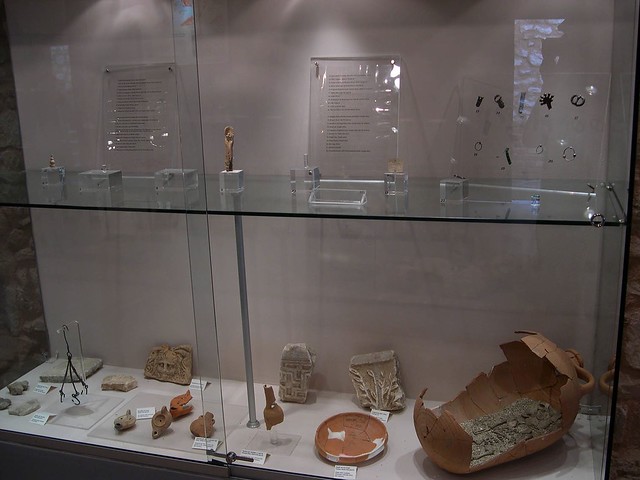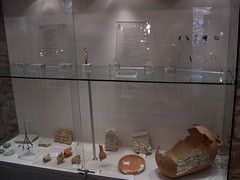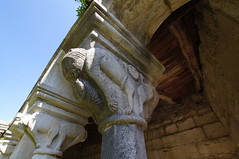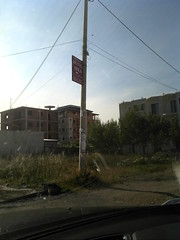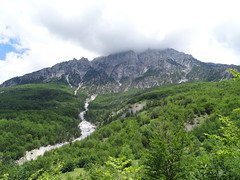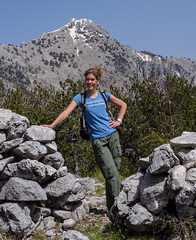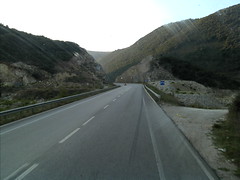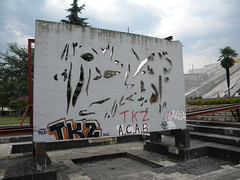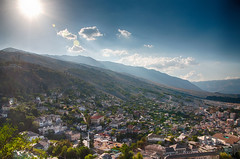 Albania
Albania
Albania (English: /ælˈbniəl-/ ; Albanian: Shqipëri or), officially the Republic of Albania (Albanian: Republika e Shqipërisë), is a country in Southeastern Europe. It is situated in the Balkans, and is located on the Adriatic and Ionian Seas within the Mediterranean Sea and shares land borders with Montenegro to the northwest, Kosovo to the northeast, North Macedonia to the east, and Greece to the south. The country displays varied climatic, geological, hydrological, and morphological conditions, in an area of . The landscape ranges from the snow-capped mountains in the Albanian Alps and the Korab, Skanderbeg, Pindus, and Ceraunian Mountains, to the hot and sunny coasts of the Adriatic and Ionian Seas along the Mediterranean. Tirana is its capital and largest city, followed by Durrës, Vlorë, and Shkodër.
Albania has been inhabited by different civilisations over time, such as the Illyrians, Thracians, Ancient Greeks, Romans, Byzantines, Venetians, and Ottomans. The Albanians established the autonomous Principality of Arbër in the 12th century. The Kingdom of Albania and Principality of Albania formed between the 13th and 14th centuries. Prior to the Ottoman conquest of Albania in the 15th century, the Albanian resistance to Ottoman expansion into Europe led by Skanderbeg won them acclaim over most of Europe. Albania remained under Ottoman rule for nearly five centuries, during which many Albanians (known as Arnauts) attained high-ranking offices in the empire, especially in the Southern Balkans and Egypt. Between the 18th and 19th centuries, cultural developments, widely attributed to Albanians having gathered both spiritual and intellectual strength, conclusively led to the Albanian Renaissance. After the defeat of the Ottomans in the Balkan Wars, the modern nation state of Albania declared independence in 1912. In the 20th century, the Kingdom of Albania was invaded by Italy, which formed Greater Albania before becoming a protectorate of Nazi Germany. Enver Hoxha formed the People's Socialist Republic of Albania after World War II, modeled under the terms of Hoxhaism. The Revolutions of 1991 concluded the fall of communism in Albania and eventually the establishment of the current Republic of Albania.
Albania is a unitary parliamentary constitutional republic. It is a developing country, ranking 67th in the Human Development Index, with an upper-middle income economy dominated by the service sector, followed by manufacturing. It went through a process of transition following the end of communism in 1990, from centralised planning to a market-based economy. Albania provides universal health care and free primary and secondary education to its citizens. Albania is a member of the United Nations, World Bank, UNESCO, NATO, WTO, COE, OSCE, and OIC. It has been an official candidate for membership in the European Union since 2014. It is one of the founding members of the Energy Community, including the Organization of the Black Sea Economic Cooperation and Union for the Mediterranean.
Name
The term Albania is the medieval Latin name of the country. It may be derived from the Illyrian tribe of Albani (Albanian: Albanët) recorded by Ptolemy, the geographer and astronomer from Alexandria, who drafted a map in 150 AD which shows the city of Albanopolis located northeast of Durrës. The term may have a continuation in the name of a medieval settlement called Albanon or Arbanon, although it is not certain that this was the same place. In his history written in the 10th century, the Byzantine historian Michael Attaliates was the first to refer to Albanoi as having taken part in a revolt against Constantinople in 1043 and to the Arbanitai as subjects of the Duke of Dyrrachium. During the Middle Ages, the Albanians called their country and referred to themselves as .
Nowadays, Albanians call their country . The words Shqipëri and Shqiptar are attested from 14th century onwards, but it was only at the end of 17th and beginning of the early 18th centuries that the placename Shqipëria and the ethnic demonym Shqiptarë gradually replaced Arbëria and Arbëreshë amongst Albanian speakers. The two terms are popularly interpreted as "Land of the Eagles" and "Children of the Eagles".
History
Prehistory
The first attested traces of Neanderthal presence in the territory of Albania dates back to the middle and upper Paleolithic period and were discovered in Xarrë and at Mount Dajt in the adjacent region of Tirana. Archaeological sites from this period include the Kamenica Tumulus, Konispol Cave and Pellumbas Cave.
The discovered objects in a cave near Xarrë include flint and jasper objects along with fossilised animal bones, while those discoveries at Mount Dajt comprise bone and stone tools similar to those of the Aurignacian culture. They also demonstrate notable similarities with objects of the equivalent period found at Crvena Stijena in Montenegro and northwestern Greece.
Multiple artefacts from the Iron and Bronze Ages near tumulus burials have been unearthed in central and southern Albania, which has similar affinity with the sites in southwestern Macedonia and Lefkada. Archaeologists have come to the conclusion that these regions were inhabited from the middle of the third millennium BC by Indo-European people who spoke a Proto-Greek language. Hence, a part of this historical population later moved to Mycenae around 1600 BC and properly established the Mycenaean civilisation.
Antiquity
In ancient times, the incorporated territory of Albania was historically inhabited by Indo-European peoples, among them numerous Illyrian tribes, Ancient Greeks and Thracians. In view of the Illyrian tribes, there is no evidence that these tribes used any collective nomenclature for themselves, while it is regarded to be unlikely that they used a common endonym. The endonym Illyrians seems to be the name applied to a specific Illyrian tribe, which was the first to come in liaison with the Ancient Greeks resulting in the endonym Illyrians to be applied pars pro toto to all people of similar language and customs.
The territory referred to as Illyria corresponded roughly to the area east of the Adriatic Sea in the Mediterranean Sea extending in the south to the mouth of the Vjosë. The first account of the Illyrian groups comes from Periplus of the Euxine Sea, an ancient Greek text written in the middle of the 4th century BC. The west was inhabited by the Thracian tribe of the Bryges while the south was inhabited by the Ancient Greek-speaking tribe of the Chaonians, whose capital was at Phoenice. Other colonies such as Apollonia, Epidamnos, and Amantia, were established by Ancient Greek city-states on the coast by the 7th century BC.
The Illyrian Ardiaei tribe, centred in Montenegro, ruled over most of the territory of Albania. Their Ardiaean Kingdom reached its greatest extent under King Agron, the son of Pleuratus II. Agron extended his rule over other neighbouring tribes as well. Following Agron's death in 230 BC, his wife, Teuta, inherited the Ardiaean kingdom. Teuta's forces extended their operations further southwards to the Ionian Sea. In 229 BC, Rome declared war on the kingdom for extensively plundering Roman ships. The war ended in Illyrian defeat in 227 BC. Teuta was eventually succeeded by Gentius in 181 BC. Gentius clashed with the Romans in 168 BC, initiating the Third Illyrian War. The conflict resulted in Roman conquest of the region by 167 BC. The Romans split the region into three administrative divisions.
Middle Ages
The Roman Empire was split in 395 upon the death of Theodosius I into an Eastern and Western Roman Empire in part because of the increasing pressure from threats during the Barbarian Invasions. From the 6th century into the 7th century, the Slavs crossed the Danube and largely absorbed the indigenous Ancient Greeks, Illyrians and Thracians in the Balkans; thus, the Illyrians were mentioned for the last time in historical records in the 7th century.
In the 11th century, the Great Schism formalised the break of communion between the Eastern Orthodox and Western Catholic Church that is reflected in Albania through the emergence of a Catholic north and Orthodox south. The Albanian people inhabited the west of Lake Ochrida and the upper valley of River Shkumbin and established the Principality of Arbanon in 1190 under the leadership of Progon of Kruja. The realm was succeeded by his sons Gjin and Dhimitri.
Upon the death of Dhimiter, the territory came under the rule of the Albanian-Greek Gregory Kamonas and subsequently under the Golem of Kruja. In the 13th century, the principality was dissolved. Arbanon is considered to be the first sketch of an Albanian state, that retained a semi-autonomous status as the western extremity of the Byzantine Empire, under the Byzantine Doukai of Epirus or Laskarids of Nicaea.
Towards the end of the 12th and beginning of the 13th centuries, Serbs and Venetians started to take possession over the territory. The ethnogenesis of the Albanians is uncertain; however the first undisputed mention of Albanians dates back in historical records from 1079 or 1080 in a work by Michael Attaliates, who referred to the Albanoi as having taken part in a revolt against Constantinople. At this point the Albanians were fully Christianised.
Few years after the dissolution of Arbanon, Charles of Anjou concluded an agreement with the Albanian rulers, promising to protect them and their ancient liberties. In 1272, he established the Kingdom of Albania and conquered regions back from the Despotate of Epirus. The kingdom claimed all of central Albania territory from Dyrrhachium along the Adriatic Sea coast down to Butrint. A catholic political structure was a basis for the papal plans of spreading Catholicism in the Balkan Peninsula. This plan found also the support of Helen of Anjou, a cousin of Charles of Anjou. Around 30 Catholic churches and monasteries were built during her rule main…
